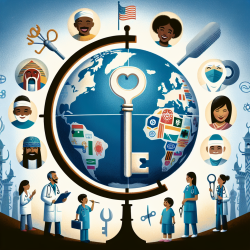Introduction
In the wake of disasters, both natural and man-made, the mental health of affected individuals can be significantly impacted. The research article "The Role of Social Determinants in Mental Health and Resilience After Disasters: Implications for Public Health Policy and Practice" highlights the critical role that social determinants play in shaping mental health outcomes and resilience. This blog post aims to provide practitioners with insights on how to implement these findings to enhance their skills and encourage further research in this vital area.
Understanding Social Determinants
Social determinants are the conditions in which people are born, live, work, and age. They include factors such as socioeconomic status, education, neighborhood and physical environment, employment, and social support networks. These determinants can significantly influence mental health outcomes following disasters. For practitioners, understanding these factors is crucial in tailoring interventions that promote resilience and recovery.
Key Findings and Implications
- Socioeconomic Status: Individuals with lower socioeconomic status are often more vulnerable to the adverse effects of disasters due to limited access to resources and support systems. Practitioners should advocate for policies that provide equitable access to mental health resources and support for low-income communities.
- Social Support: Strong social support networks are protective factors that enhance resilience. Practitioners can facilitate community-building activities and support groups to strengthen these networks.
- Gender and Age: Women and children are often more susceptible to mental health issues post-disaster. Tailored interventions that address the specific needs of these groups can improve outcomes.
Practical Applications for Practitioners
Practitioners can enhance their skills by integrating the following strategies into their practice:
- Conduct comprehensive assessments that consider social determinants when evaluating clients' mental health needs post-disaster.
- Develop and implement community-based programs that build resilience by leveraging local resources and networks.
- Advocate for policy changes that address systemic inequities contributing to mental health disparities.
- Engage in continuous professional development to stay informed about the latest research and best practices in disaster mental health.
Encouraging Further Research
While significant progress has been made in understanding the role of social determinants in mental health resilience, there is still much to learn. Practitioners are encouraged to engage in research initiatives that explore innovative interventions and strategies to mitigate the mental health impacts of disasters. Collaborative efforts between researchers, practitioners, and policymakers can lead to more effective and sustainable solutions.
Conclusion
By integrating the insights from the research on social determinants and mental health resilience, practitioners can play a pivotal role in enhancing the well-being of individuals and communities affected by disasters. Continuous learning and advocacy are essential in driving the changes needed to support mental health recovery and resilience.
To read the original research paper, please follow this link: The Role of Social Determinants in Mental Health and Resilience After Disasters: Implications for Public Health Policy and Practice.










